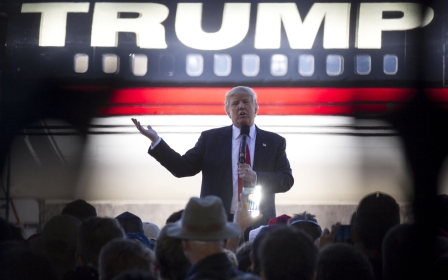'Americans are pro-torture and proud of it'

On the campaign trail, Donald Trump has made repeated promises to violate the Geneva Convention by reintroducing the use of torture for enemy combatants. “ISIS are chopping heads off and drowning people in steel cages, and we won’t even water-board a few terrorists,” said Trump at a recent GOP presidential debate.
Americans, having endured shame, humiliation and global condemnation for the Bush/Cheney torture programme, were outraged. Social media lit up with justifiable anger, so much so that “Geneva Convention” became the hottest trending topic on Twitter.
Apparently, however, the counter outrage to Trump’s moral depravity appears to have been overblown. As it turns out, Americans are totally down with torture. A new Reuters poll shows nearly two-thirds of Americans believe the use of torture on suspected terrorists is justifiable.
Secular enlightenment be damned. Americans are pro-torture and proud of it.
America’s soft spot for torture resembles countries that are besieged by civil war and social chaos, countries such as Nigeria and Kenya, rather than countries who boast secular democratic liberalism.
When examined along political party lines, it can be said that while a plurality of Democratic voters are pro-torture, Republicans are almost giddy about torture – with 82 percent in favour of its use to extract information.
Essentially, it can also be said that the use of torture is as popular among Republican voters as it is among those who fly the black flag of the Islamic State. If that doesn’t say something about the myth of human progress, I don’t know what does.
“You’re dealing with people who don’t play by any rules. And I can’t see why we would tie our hands and take away options like waterboarding," a Trump supporter, Jo Ann Tieken, 71, told Reuters.
Evidently, her sentiments echo the sentiments of a majority of Americans, which is both tragic and perverse.
For one thing – torture doesn’t work. “Psychologists knew there was a broad consensus in behavioural science research that showed torture did not work,” writes James Risen about the Bush/Cheney torture programme and the complicity of the American Psychological Association in Pay Any Price. “And yet they didn’t complain. Worse, they participated, and quietly changed their profession’s ethics code to allow torture to continue. In return, the psychologists were showered with government money and benefits.”
But more than that – torture is an act rooted in misguided brutality, urged on by a sense of revenge and humiliation. When the US Senate’s investigation into the CIA’s torture programme was released to the American public, this column argued that the nation’s ambivalence towards the senate’s report was, in itself, a reflection of the collective humiliation Americans suffered on 9/11.
“We know from history that collective humiliation can be a goad to various kinds of aggressive behaviour - as has been true of bin Laden and al-Qaeda,” writes the acclaimed psychiatrist Robert Jay Lifton.
Lifton draws a parallel between the apocalyptic vision of the United States and that of Islamic terrorists. “In particular, we are experiencing what could be called an apocalyptic face-off between Islamist forces, overtly visionary in their willingness to kill and die for their religion, and American forces claiming to be restrained and reasonable but no less visionary in their projection of a cleansing war-making and military power,” writes Lifton. “Both sides are energised visions of intense idealism; both see themselves as embarked on a mission of combating evil in order to redeem and renew the world; and both are ready to release untold levels of violence to achieve that purpose.”
Clearly, this troubling poll into the support of torture finds America again at a moral tipping point. Does it take on the identity of those who embrace dark forces to do it harm or does it stay true to American democratic values – ones that embrace international law and human rights?
If the war on terror isn’t a contest between the values "we" hold dear and the values "they" decry, then we become a blind man punching himself in the mirror. “At the outset of every war … we hastily transform our enemy into the image of the demonic,” said the psychologist Rollo May. “And then, since it is the devil we are fighting, we can shift onto a war footing without asking ourselves all the troublesome and spiritual questions that the war arouses. We no longer have to face the realisation that those we are killing are persons like ourselves.”
Senator John McCain (R-AZ) was on the receiving end of torture during his time as a prisoner of war in North Vietnam. In a statement delivered on the floor of the US Senate, McCain made it clear torture runs counter to American values: “I have often said, and will always maintain, that this question isn’t about our enemies, it’s about us. It’s about who we were, who we are and who we aspire to be. It’s about how we represent ourselves to the world.”
McCain also reminded Americans that torture fails to produce actionable intelligence, despite attempts by war hawks to justify its use. “What might come as a surprise, not just to our enemies, but to many Americans, is how little these practices did to aid our efforts to bring 9/11 culprits to justice and to find and prevent terrorist attacks today and tomorrow,” said McCain.
More reliable human intelligence is gathered by conventional interrogation methods, and by stronger relationships with international partners. When America advocates or engages in the use of torture, it alienates itself from the international community, and emboldens its enemies, which again serves to illuminate the dangerous path Trump and two-thirds of Americans are willing to re-navigate.
- CJ Werleman is the author of Crucifying America (2013), God Hates You. Hate Him Back (2009), and Koran Curious (2011), and he is the host of Foreign Object. Follow him on twitter: @cjwerleman
The views expressed in this article belong to the author and do not necessarily reflect the editorial policy of Middle East Eye.
Photo: A protester mimics a photo of prisoner abuse at the Abu Ghraib prison in Iraq during a demonstration in front of the White House in Washington 26 September 2005 (AFP).
Stay informed with MEE's newsletters
Sign up to get the latest alerts, insights and analysis, starting with Turkey Unpacked
Middle East Eye delivers independent and unrivalled coverage and analysis of the Middle East, North Africa and beyond. To learn more about republishing this content and the associated fees, please fill out this form. More about MEE can be found here.





